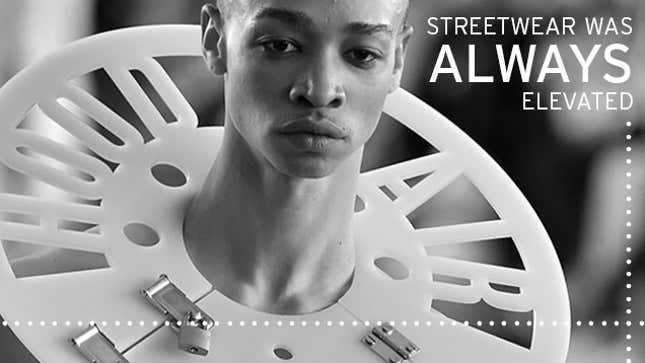A Brief Taxonomy of the Fuccboi (RIP)
Latest

This week, the New York fashion label Hood by Air put on its second show this fashion month—a presentation in Paris after its celebrated runway in New York earlier this September, to be capped off by a third, as-yet-unnamed event in October. Showing at two fashion weeks in the same month is fairly boss, especially for a relatively new shop like Hood by Air. Started on a budget by New Yorker Shayne Oliver, the label has had a pretty meteoric rise over the past two years, particularly for a black designer (still far too rare in the establishment-anointed fashion world) who brings Harlem style to high-end streetwear. Let’s just say it’s a long way from showing your fashion week collection at Santos Party House to being nominated by Anna Wintour and them for a CFDA Prize.
Anna Wintour aside, a main reason for Hood by Air’s ascent into the mainstream was the cachet it earned among rap fans and those generally unconcerned with niche New York fashion labels when A$AP Rocky, a friend of Oliver’s, started repping the brand at every chance, both in song and on his person. On the 2012 song “Bath Salt,” he rapped, “Ima stunna/Hood by Air for the summer/toast to the God and it cost nine hunna.” By 2013, the proliferation of HBA shirts on fans had reached such critical mass that Rocky patted himself on the back in “Angels” with the lyric, “Hood by Air/I started that.”
Enter: the fuccboi—loosely, a streetwear trend-humper who pairs items like Hood by Air logo tees with dropcrotch shorts over leather leggings and tops it off with a sheen of Rick Owens, figuratively more than literally. This in itself is not an offense, but it is the way the wearer does these things that leads to fuccboi’ism—a certain blend of awkwardness and thirst, combined with lots of disposable income (HBA t-shirts run around $200 on average) that translates into a need to be associated with the culture it inhabits, while perhaps not actually being of said culture. The now-stagnant tumblr Fuccboi of the Day, with its tagline “money doesn’t buy style,” is a decent visual primer on the phenomenon: mostly street pics of people wearing pricy streetwear labels seemingly just for the logo, the way status-conscious, often middle-class women in the Midwest covet handbags by Coach and Dooney & Burke. It’s aspirational, but basic. It’s funny, but depressing.
-

-

-

-

-

-

-

-

-

-

-

-

-

-

-

-

-

-

-

-

-

-

-

-

-

-

-

-

-

-

-

-

-

-

-

-

-

-

-

-








































